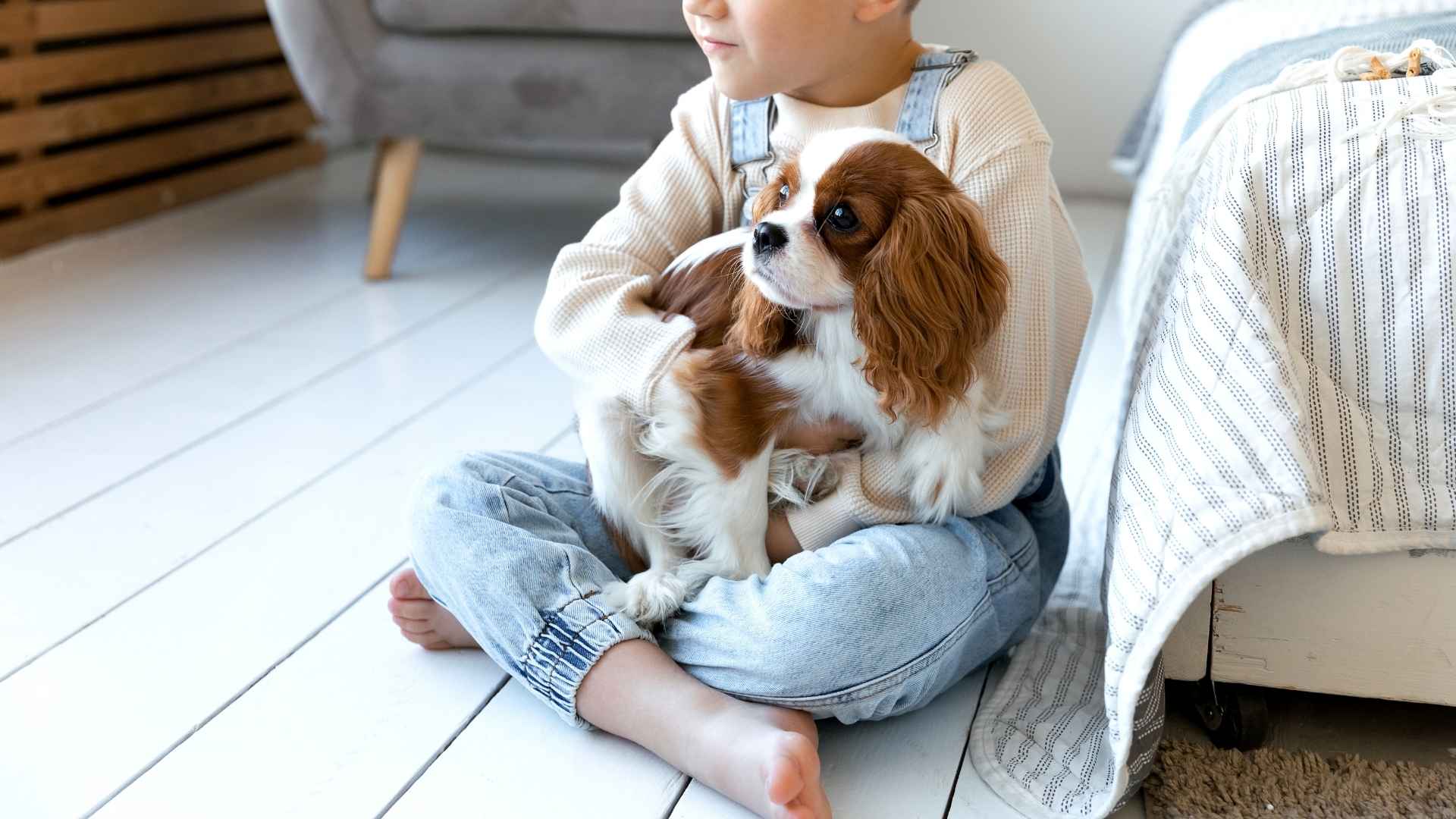Finding the right dog for kids with autism can be life-changing. The connection between children and pets, especially dogs, can provide emotional support, stability, and comfort, making them invaluable companions. However, not all dogs are suited for every situation or child with autism.
Some breeds are naturally more patient, calm, and affectionate, making them ideal for children who need additional emotional support or a steady presence.
In this article, we will explore the 7 best dog breeds for kids with autism—dogs that excel in creating deep, meaningful bonds with children. These breeds offer more than just playmates; they provide an understanding, calming presence that can help children manage sensory sensitivities and emotional challenges.
Dog Breeds for Kids with Autism
1. Labrador Retriever

Labrador Retrievers are widely adored for their friendly nature, outgoing personalities, and strong family bonds. These dogs have a natural affinity for children and exhibit patience, making them a favorite among families with young ones. With a high level of intelligence, they excel in learning commands and tricks, ensuring they are easy to train and responsive. Labradors are also known for their eagerness to please, enhancing their role as companions.
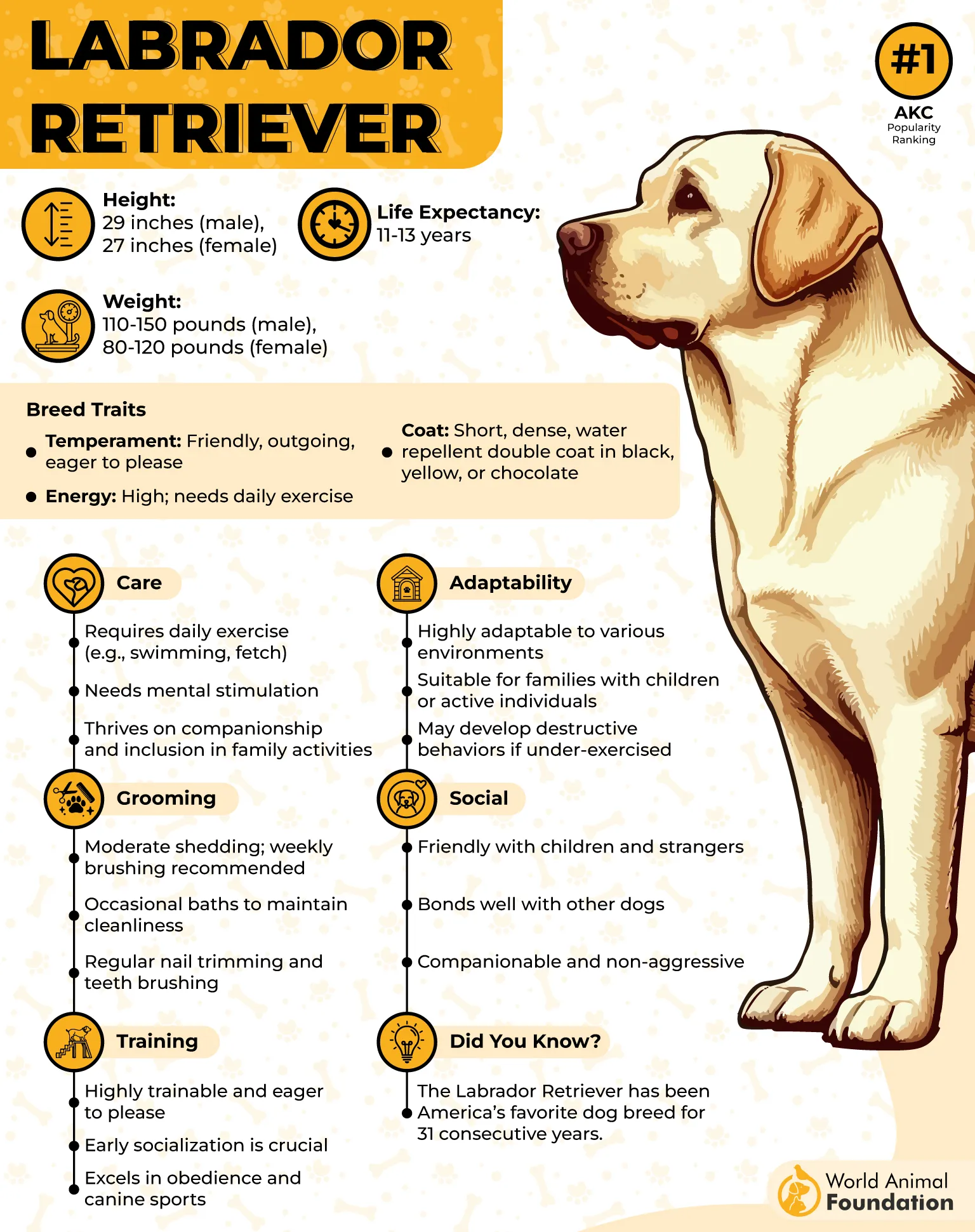
This breed is extremely versatile, often seen as an assistance dog in many roles, such as therapy and search-and-rescue dogs. Labs are often employed as service animals because of their calm and reliable temperament. Their desire to help and protect makes them especially suitable for families looking for a dog that offers emotional support and stability.
Regarding physical traits, Labrador Retrievers are medium to large-sized dogs with strong, muscular bodies. Their short, dense coats shed seasonally, but regular grooming can keep shedding under control. Labs require plenty of exercise to maintain their health, and they enjoy activities such as running, swimming, and hiking, making them a good match for active families.

This breed of perfect dog has a gentle mouth, often known for carefully carrying objects without damaging them, which is why they were historically used as hunting companions. Labs are reliable, and their easygoing nature makes them a great fit for families with children, especially those with sensory needs.
Labrador Retrievers are among the most popular social dog breeds in the United States, consistently ranking number one due to their affectionate nature and ability to get along with nearly everyone, including children and other pets.
2. Saint Bernard
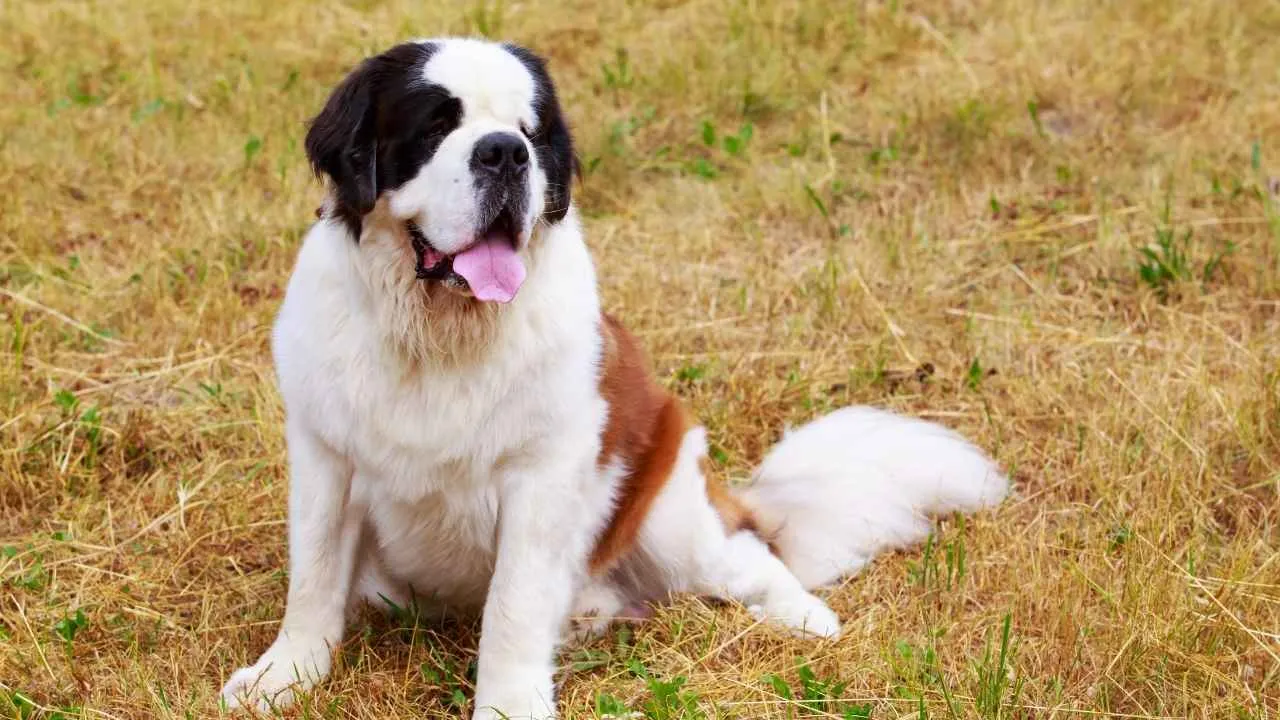
Britannica says Saint Bernards are known as gentle giants, with massive frames belied by their calm and affectionate nature. These dogs are large, but they have an incredibly sweet temperament, which makes them ideal companions for children. They are known as nanny dogs for their patience and ability to bond with their human family members, making them a great addition to any home where they can receive lots of love and attention.
Originating in the Swiss Alps, monks initially bred these dogs to rescue travelers who got lost in the mountains. Their incredible strength and keen sense of smell made them excellent at performing rescue operations in harsh conditions. Although they are not used for mountain rescues today, their instinct to care for others is still prominent, especially in family settings.
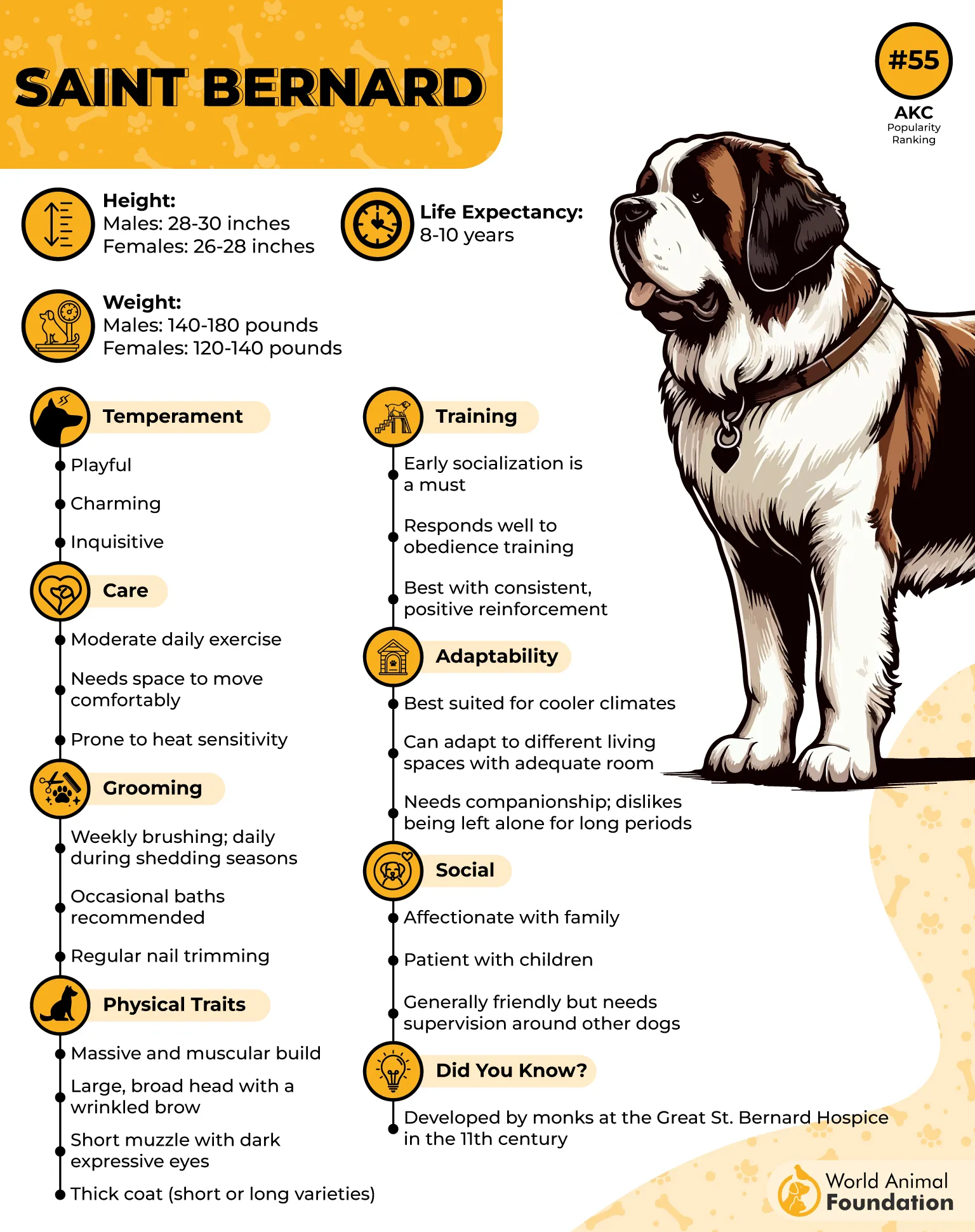
Saint Bernards tend to have a slower pace, which can be advantageous for families seeking a more relaxed dog. While they still require exercise, they are typically content with moderate walks and time spent indoors with their family. Their size, however, can be a consideration for families with smaller living spaces, but their gentle disposition generally makes them adaptable to different environments.
Despite their large size, Saint Bernards are surprisingly gentle around children and can act as emotional support animals, offering a sense of security and comfort. Their calmness helps reduce anxiety, especially for children who may become overwhelmed. Their affection and loyalty make them excellent pets for fostering an emotional connection with children.
Fun fact: Saint Bernards are famous for their role in rescuing stranded travelers, and many people believe they carried barrels of brandy around their necks. While the barrels were more of a legend than fact, the breed’s heroic legacy continues to be celebrated in popular culture.
3. Golden Retriever
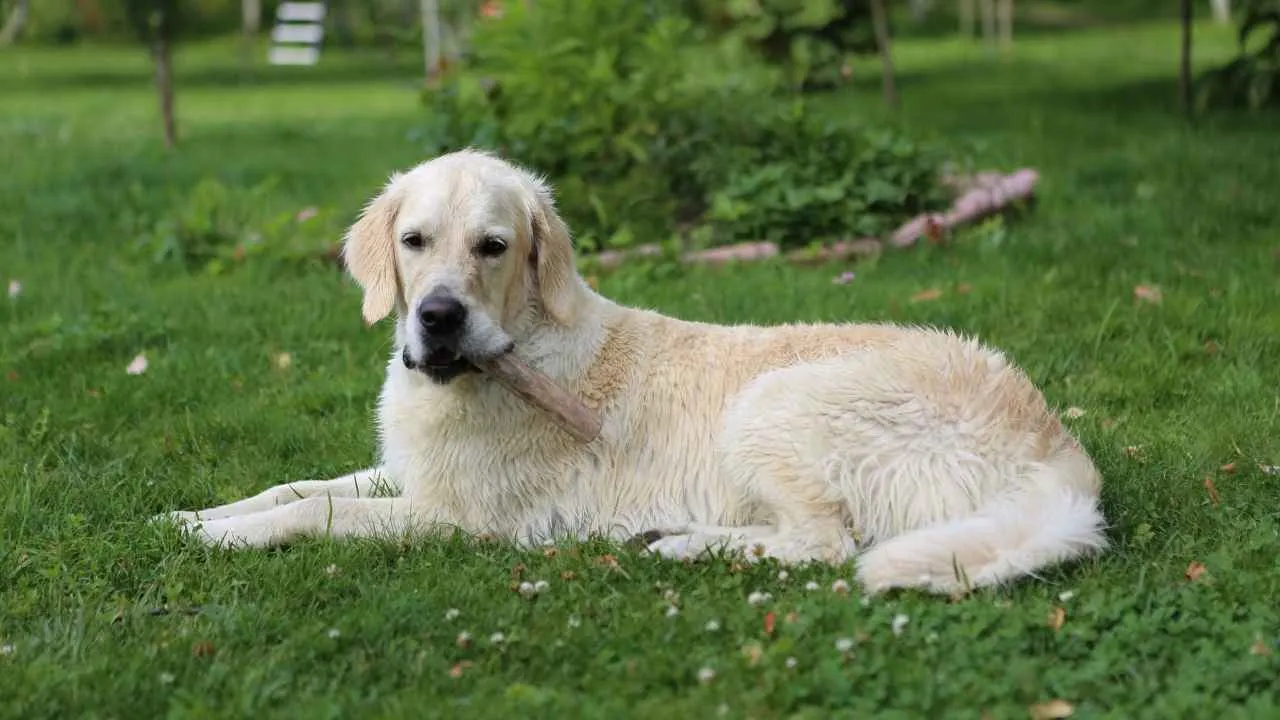
Golden Retrievers are perhaps one of the most recognized dog breeds for their loving and adaptable nature. They are known for their boundless energy, friendly demeanor, and eagerness to engage with family members. This breed’s outgoing personality and intelligence make them highly trainable, and they are often used as service dogs for children with developmental needs. Their easygoing nature and high social intelligence make them an excellent family choice.
These dogs are well-suited for homes with children due to their innate gentleness and understanding. Golden Retrievers thrive on human interaction and enjoy playing games such as fetch, swimming, or simply cuddling on the couch. Their patient and tolerant behavior ensures they can handle the energetic movements and sudden sounds common in many households with children.

Golden Retrievers have a lovely golden coat that requires regular grooming to keep it shiny and healthy. They are moderate shedders, so consistent brushing can help manage the shedding and reduce allergens. Additionally, these dogs are active and enjoy outdoor activities, so families who love spending time outside can bond easily with a Golden Retriever through walking, hiking, or even running.
This breed’s intelligence is another key factor in making them ideal for families with special needs. Golden Retrievers are known to excel in obedience and various dog sports, and they are one of the most popular breeds used as service dogs. They provide emotional support, comfort and even aid in daily tasks for children and adults alike.
Golden Retrievers are famous for their ability to “smile” with open mouths, which only adds to their charm as family-friendly companions. Their innate kindness and loyalty have earned them a spot as one of the most beloved dog breeds worldwide.
4. Bernese Mountain Dog
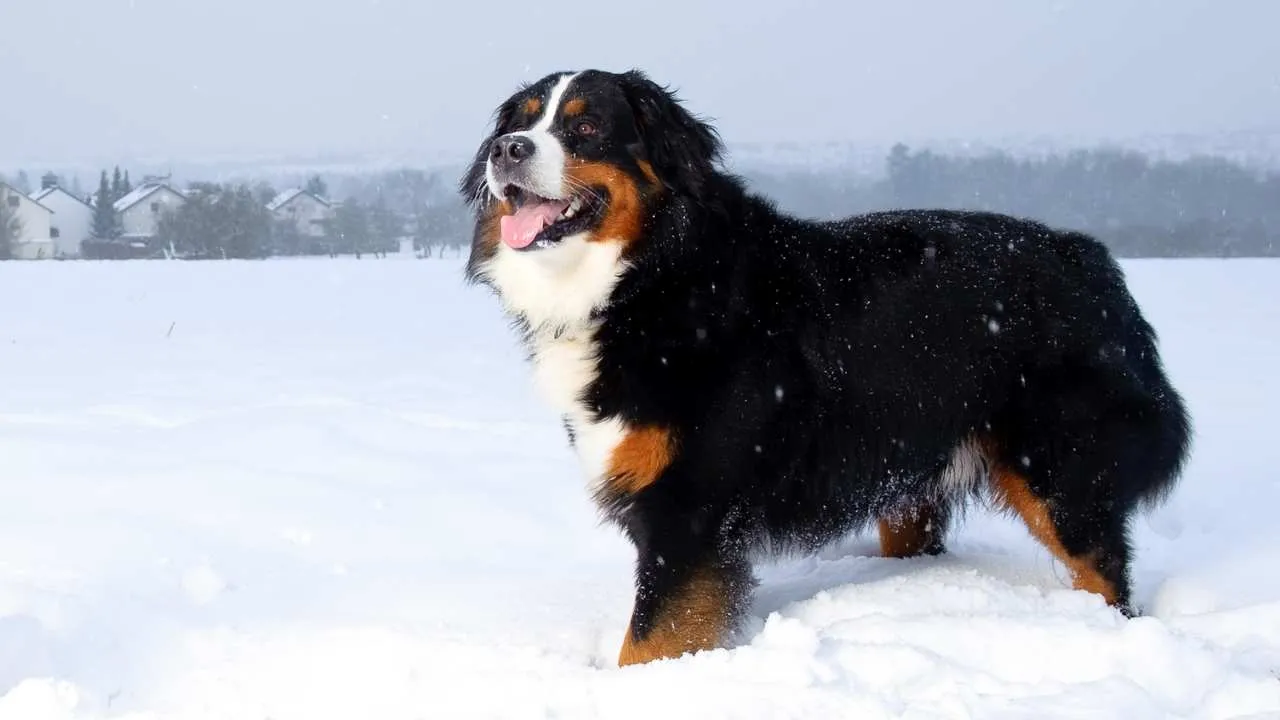
The Bernese Mountain Dog is a majestic and affectionate breed that strikes a perfect balance between being a calm companion and a loyal protector. Their large, sturdy frame is matched by an equally large heart, as these dogs are known for their gentle and loving nature. The breed’s calm temperament makes them great with children, and they are particularly patient, which is essential for families with younger children who may require additional reassurance.
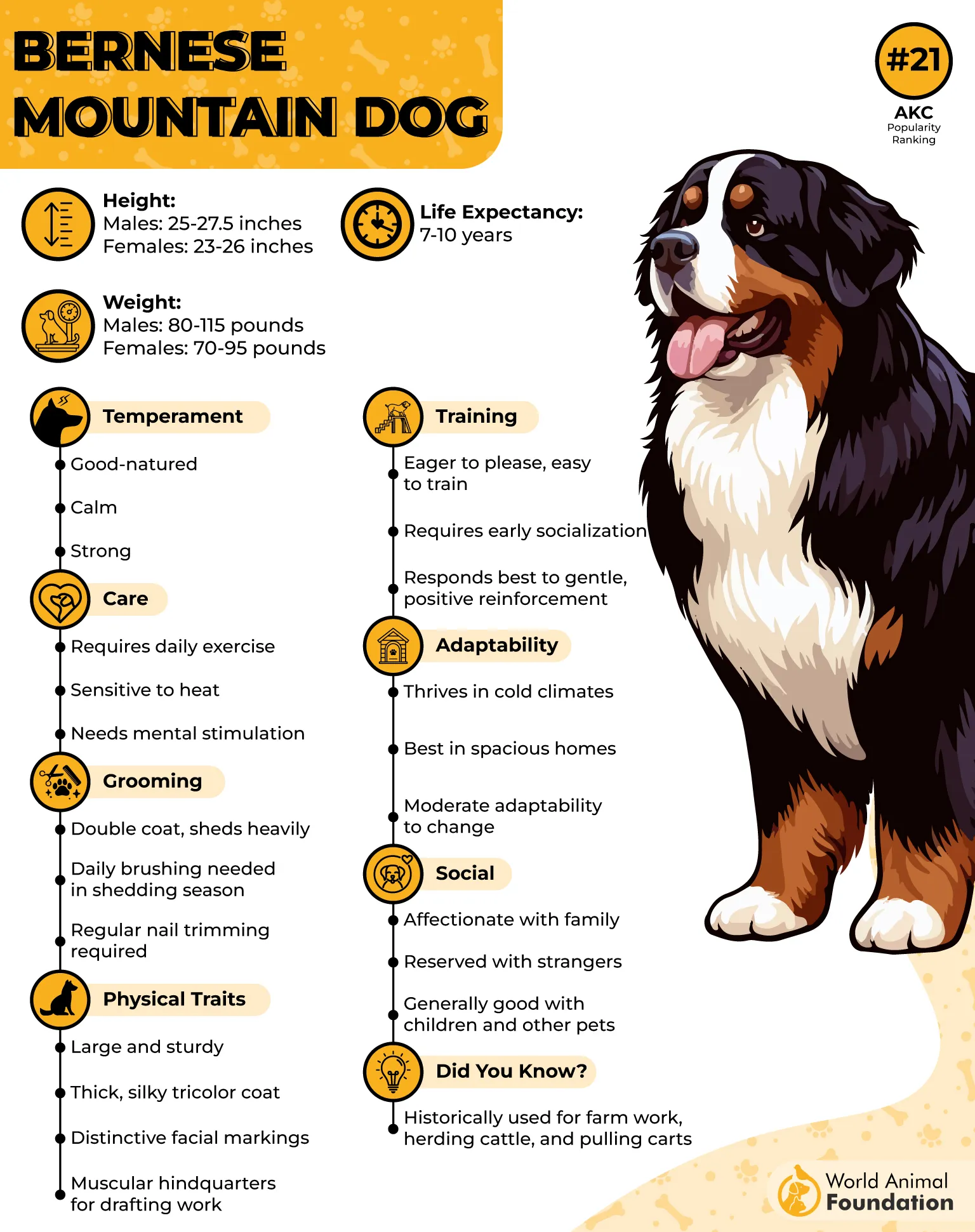
This breed was originally bred to work on farms in Switzerland, which means they have a strong work ethic and are accustomed to being around people. Bernese Mountain Dogs are naturally social and thrive in environments where they can interact with other dogs and family members. Their instinct to bond deeply with their owners makes them an excellent choice for children in need of a steady, loving companion.
Despite their large size, Bernese Mountain Dogs are very affectionate and enjoy spending time with their families, as described by PetMD. They are excellent companions for outdoor activities, but they are also content with quieter moments spent indoors, making them well-suited for homes of all sizes. These dogs need regular grooming, as their thick coats can shed considerably, especially in warmer climates.
One of the most striking characteristics of the Bernese Mountain Dog is its tri-colored coat, which is not only beautiful but also provides insulation during cold weather. They are great for families who live in cooler climates, where their natural coat helps keep them comfortable outdoors during colder months.
A fun tidbit: Bernese Mountain Dogs have a relatively short lifespan for large breeds, typically living between 7 and 10 years, but during their lifetime, they offer unparalleled devotion and affection. Their affectionate and loyal personalities leave a lasting impression on all who meet them.
5. Newfoundland
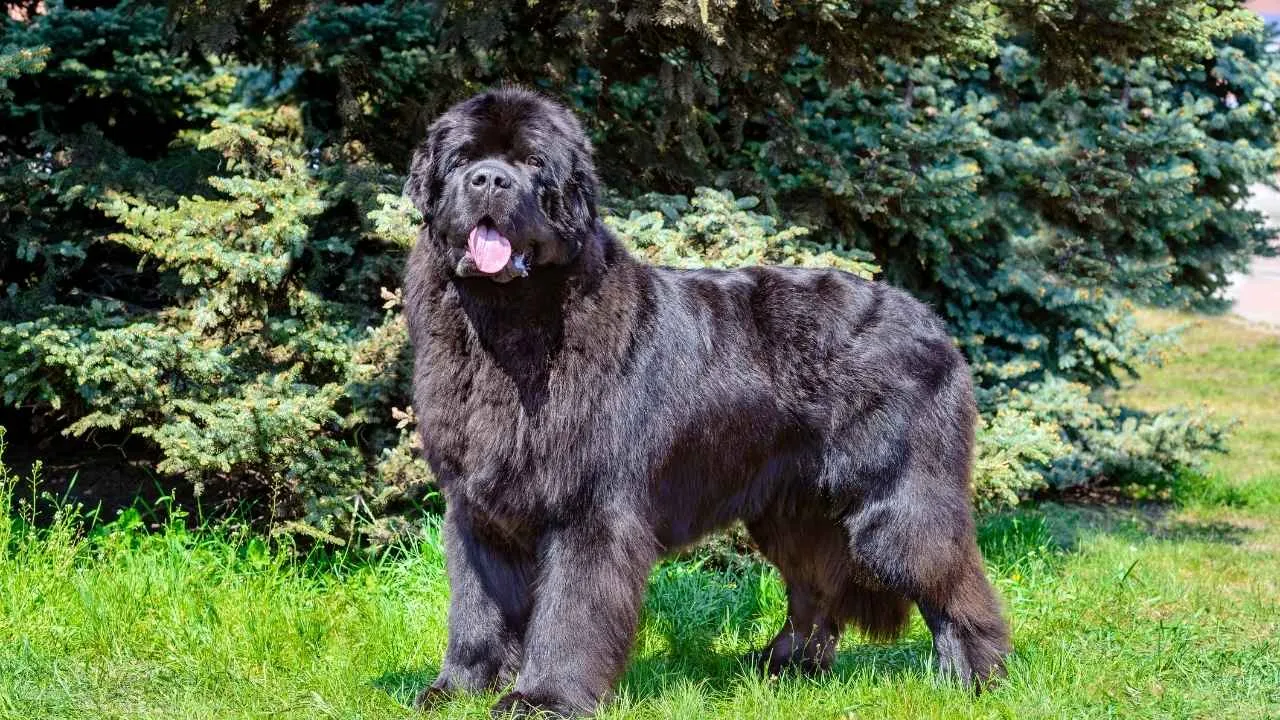
Newfoundlands are truly gentle giants, known for their calm demeanor and affectionate nature. These dogs are particularly good around children and other pets due to their patient and tolerant personalities. They are often described as “nature’s babysitters” because of their good temperament and their ability to interact calmly with children and be a source of comfort for them.
Originally bred to assist fishermen in Newfoundland, these dogs are excellent swimmers with a natural ability to rescue people from water, says the AKC. Their webbed feet and water-resistant coats make them uniquely suited to aquatic environments, so families near water can have an extra level of safety and fun when this breed is involved. Their love for water is part of their playful personality, making them perfect playmates for kids who enjoy swimming.
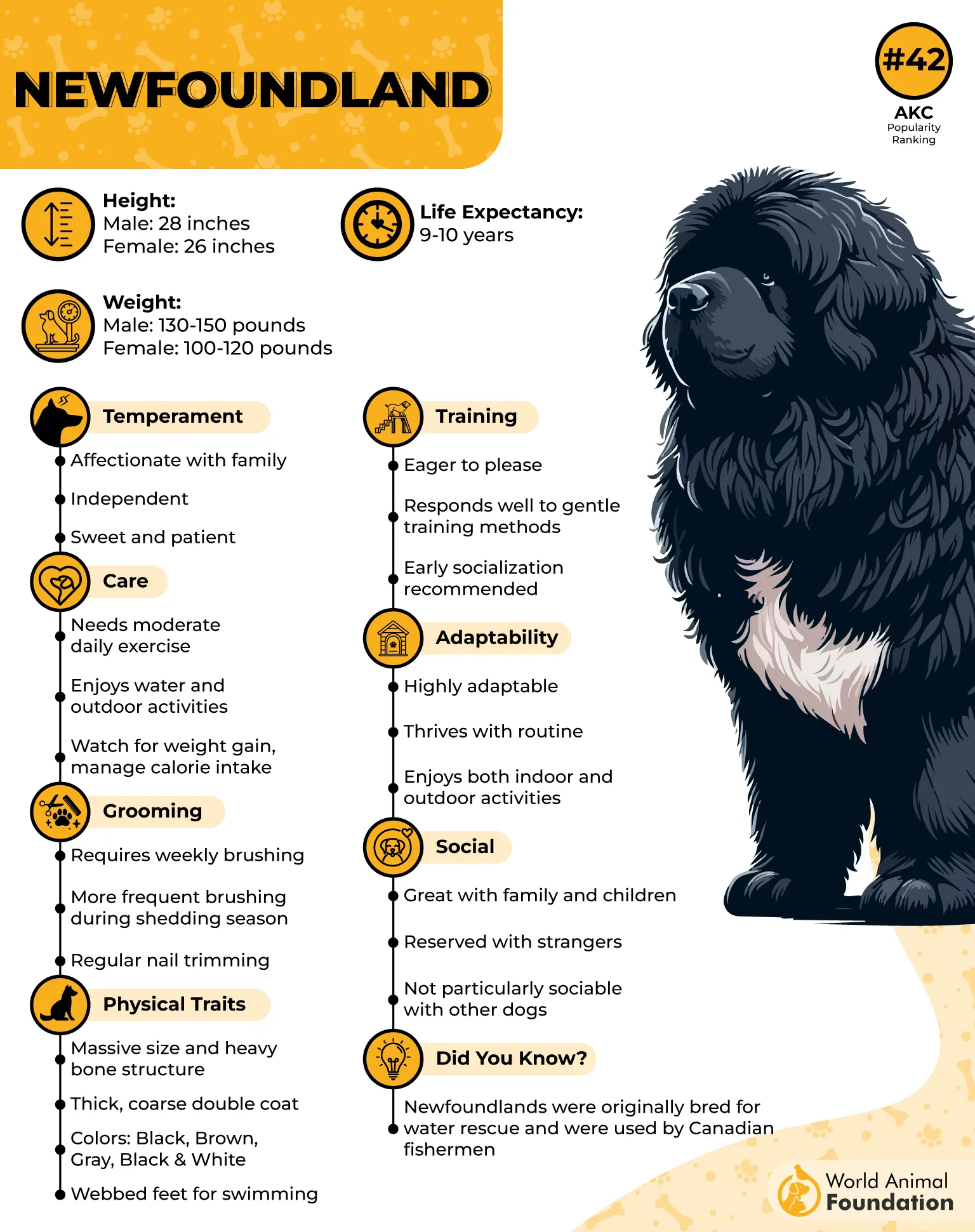
Newfoundlands are large dogs, and their size requires some space, but they are often surprisingly gentle and quiet. Their calm nature allows them to be content in both urban and rural settings, as long as they get sufficient exercise and attention. These dogs are also extremely loyal, forming deep connections with their families, which makes them great emotional support animals.
While these dogs are relatively low-energy indoors, they still require regular outdoor activities to stay healthy. Their large size means they should be monitored for weight gain, as they are prone to joint issues. Regular exercise is vital for their well-being and helps them maintain their friendly, outgoing nature.
Newfoundlands have saved countless lives throughout history due to their natural swimming abilities. The breed’s contribution to water rescues has been widely recognized, and their heroic acts have made them iconic in their home region.
6. Poodle
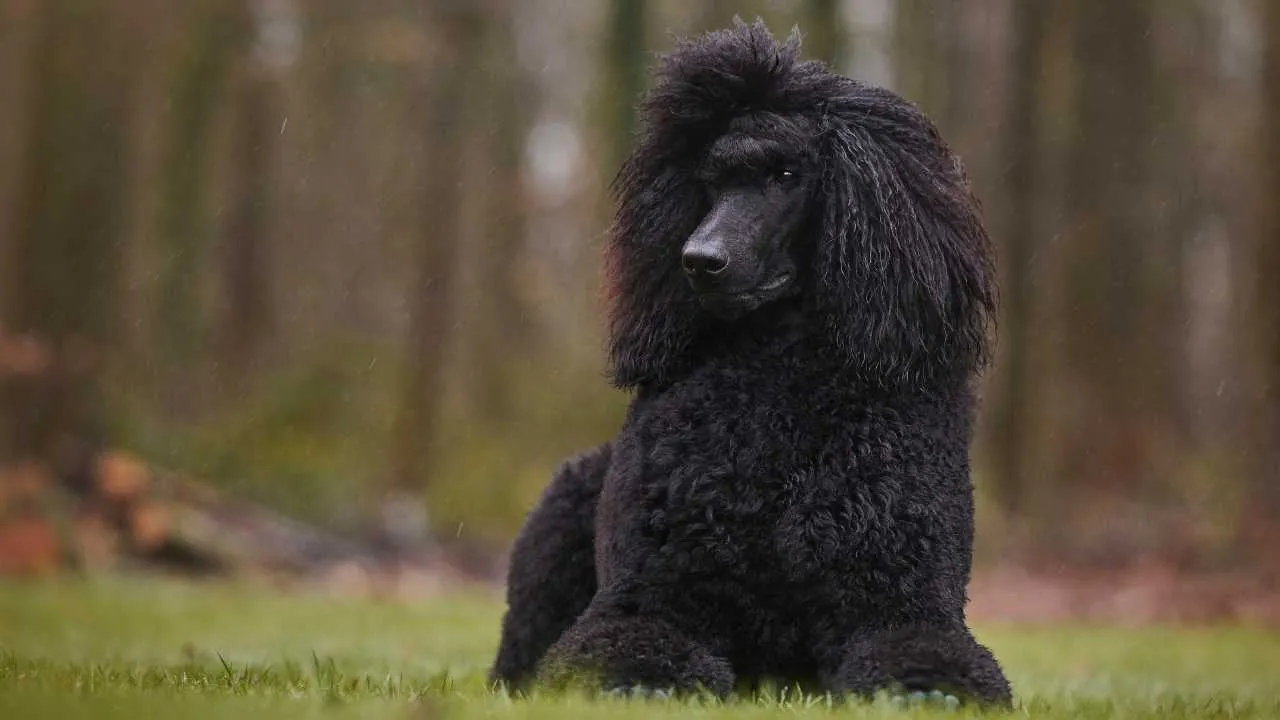
The Poodle is a highly intelligent dog and a versatile breed that makes an excellent companion for families. Their quick learning ability and strong desire to please make them easy to train and well-suited for a variety of roles, including service animals.
Poodles come in three sizes: standard, miniature, and toy, offering families options based on their space and lifestyle needs. Their hypoallergenic coats are another major appeal, as they shed very little, making them a good choice for households with allergies.
One of the Poodle’s key features is their energy level. Active dogs require regular mental and physical stimulation to stay happy and healthy. With their love for play and exercise, Poodles enjoy activities such as running, fetching, and even swimming. Their playful nature ensures that they can easily adapt to family life, bringing joy to both children and adults.
Despite their royal appearance, Poodles are incredibly down-to-earth and affectionate. They are known to form strong bonds with their family members and thrive on human companionship. Their gentle nature and calm demeanor make them wonderful companions for children, particularly those who may benefit from a patient and understanding dog.
Another fascinating aspect of Poodles is their long history of being working dogs. Originally bred in Germany as water retrievers, they excelled at retrieving game from water due to their natural swimming abilities. This heritage has contributed to their intelligence and versatility in various roles, from circus performers to therapy dogs.
Poodles are not just fashionable pets; they were originally bred to be hard-working dogs. Their curly coats were designed to provide warmth and protection when swimming in cold water. Today, their hypoallergenic coats make them a favorite choice for families with allergies.
7. Cavalier King Charles Spaniel

The Cavalier King Charles Spaniel is a small yet affectionate breed known for its gentle, loving nature. These dogs are incredibly adaptable, fitting well into various living situations, whether in apartments or larger homes.
Cavalier King Charles Spaniels are not only sweet-natured but also quite social, and they generally get along well with other breeds of animals and children. Their gentle temperament makes them easy to handle and ideal for families with younger kids.
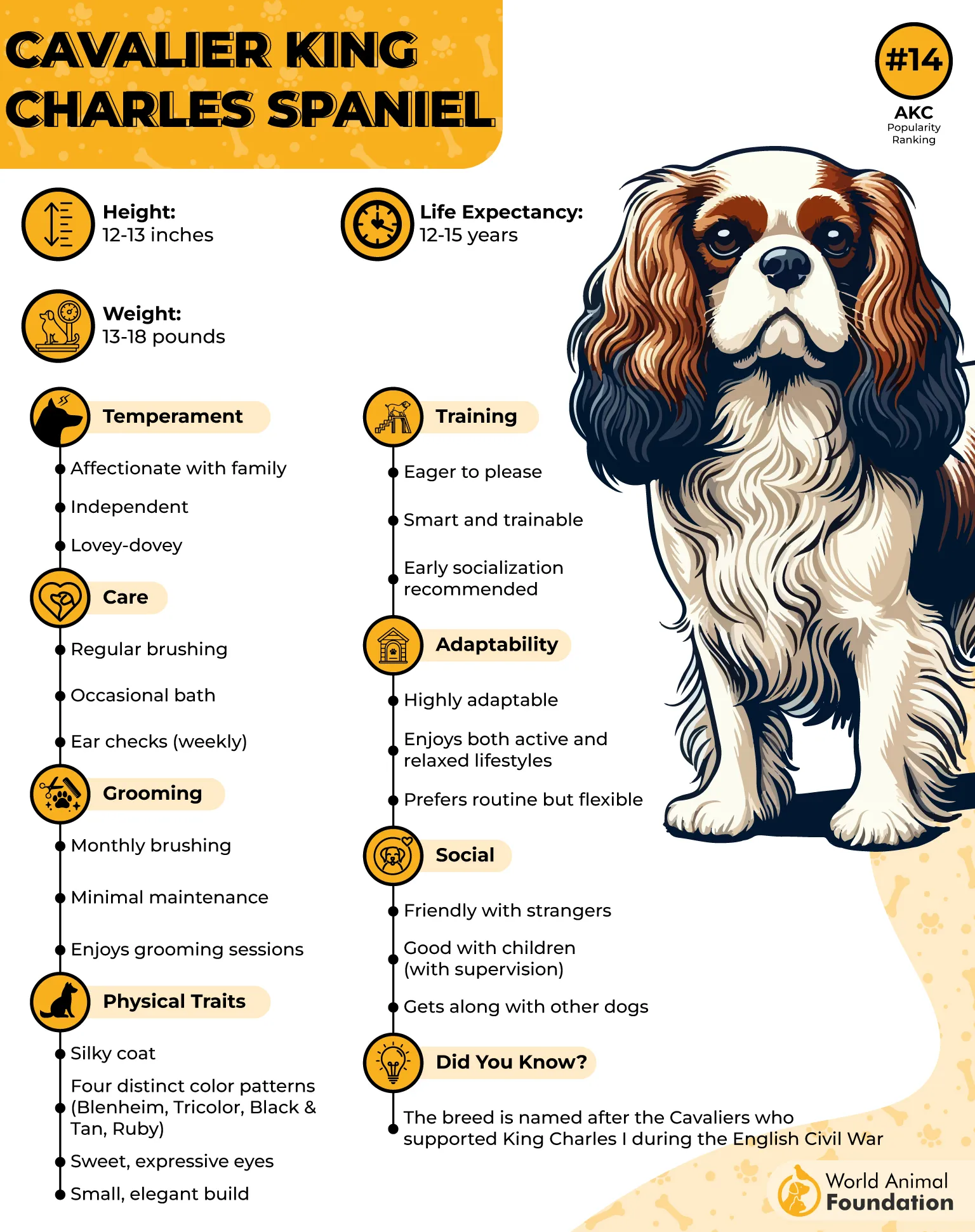
These dogs enjoy being the center of attention and are particularly good at providing comfort and companionship. They often seek to be close to their human family members, making them excellent lap dogs.
This breed is characterized by its silky, medium-length coats, which require regular grooming to keep them in top condition. While they are not as high-energy as some larger breeds, Cavaliers enjoy daily walks and time spent playing with their families.
Their affectionate nature and desire to please make them easy to train and responsive to commands, which greatly benefits a family setting.
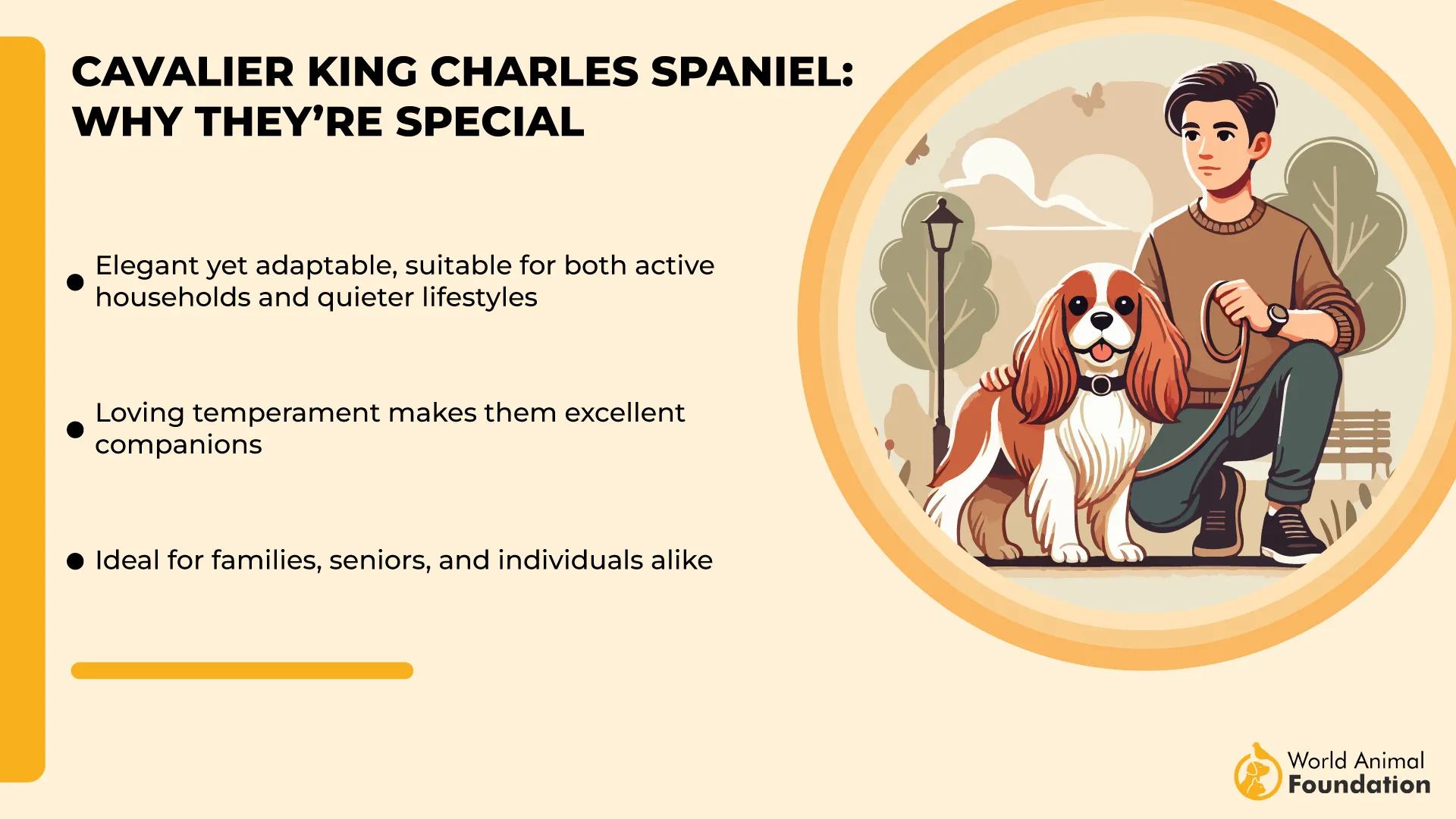
Cavalier King Charles Spaniels are also known for their intelligence and adaptability, making them capable of quickly learning new tasks. While they do enjoy a good game, they also love to relax and cuddle, offering the perfect balance for families who want a dog that can switch from active to laid-back depending on the situation.
Despite their aristocratic appearance, Cavalier King Charles Spaniels were originally bred to be companion dogs for royalty. They are named after King Charles II of England, who was particularly fond of the breed, and they have since retained their reputation as affectionate and well-mannered companions.
Conclusion
When choosing the best dog breeds for kids with autism, it’s essential to focus on breeds that offer a calm temperament, emotional stability, and a loving nature. Golden Retrievers and Labrador Retrievers are often recommended for their gentle demeanor, intelligence, and affectionate nature. These loyal companions excel in providing emotional support and helping children with autism spectrum disorders improve their social skills. Their patient temperaments make them an ideal match for children who need a calming influence, a safe environment, a mentor, and a comforting presence.
While larger breeds like the Bernese Mountain Dogs and Saint Bernards are known for their gentle giant status, they can also be perfect companions for autistic children. Their loving and protective nature and ability to form strong bonds make them great for helping children feel safe and loved. However, for families with autism, children prefer smaller breeds, like the Cavalier King Charles Spaniel. It offers a playful nature and is a wonderful option for providing unconditional love in a more compact package.
Whether it’s a Golden Retriever, German Shepherd, or even a Great Pyrenees, choose the right dog breed suitable for your particular needs. With proper training, these autism service dogs can perform specific tasks, reduce anxiety, and help improve verbal communication. The bond formed between an autistic child and their canine companion can lead to positive interactions that foster growth, emotional well-being, and self-confidence. When matched correctly, these affectionate dogs can provide emotional support and a calming presence that becomes a life-changing source of comfort for the entire family.


